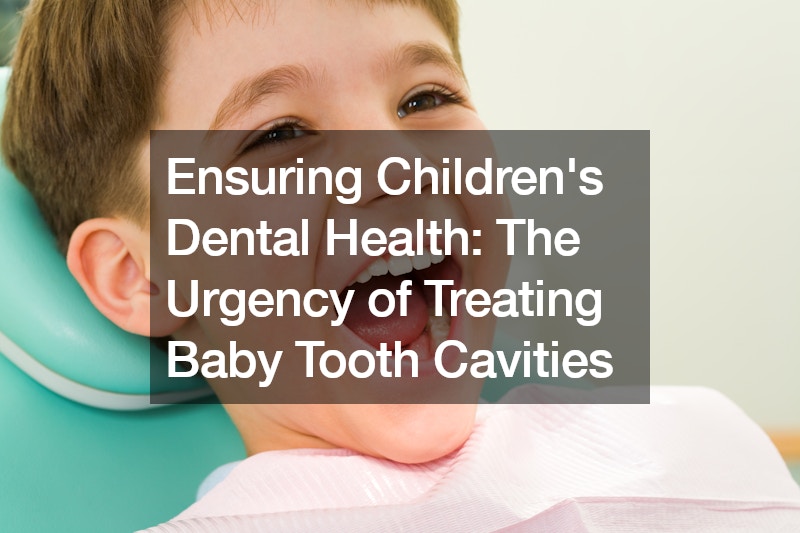

A common misconception about baby teeth is that cavities in them aren’t a big deal since they’ll eventually fall out anyway. However, this thinking can have serious consequences for a child’s overall oral health. Early intervention and treatment of cavities in baby teeth are crucial for ensuring the healthy development of permanent teeth and preventing future complications.
Why Baby Tooth Cavities Matter
Baby teeth, also known as primary teeth, play a vital role in a child’s development. They not only help with chewing and speaking but also serve as placeholders for permanent teeth developing underneath the gums.
These primary teeth guide the eruption of permanent teeth into their proper positions, ensuring a healthy and functional smile.
Leaving cavities untreated in baby teeth can lead to a domino effect of problems. Here’s why treating them promptly is essential:
- Spreading Infection: Cavities are caused by bacteria that feed on sugar and produce acid. This acid erodes tooth enamel, creating a hole. If left untreated, the bacteria can continue to grow and spread to neighboring teeth, causing additional cavities.
- Pain and Discomfort: As a cavity grows, it can reach the sensitive inner pulp of the tooth, causing significant pain and discomfort for a child. This pain can make it difficult for them to eat, sleep, and concentrate.
- Risk of Infection: Untreated cavities can become infected, leading to an abscess (a pus-filled pocket) in the gum tissue. This can cause swelling, pain, and even fever. In severe cases, the infection can spread to other parts of the body.
- Premature Tooth Loss: When a cavity weakens a tooth significantly, it can lead to premature tooth loss. This can disrupt the natural spacing of teeth, causing crowding and misalignment issues when permanent teeth erupt.
- Damage to Permanent Teeth: The developing permanent tooth bud lies beneath the baby tooth. In some cases, a severe cavity in a baby tooth can damage the developing permanent tooth, leading to its eruption with enamel defects or discoloration.
Treatment Options for Baby Tooth Cavities
Fortunately, there are several effective treatment options available for baby tooth cavities. The best course of action depends on the severity of the cavity. Here’s a breakdown of common treatments:
- Fluoride Treatments: For very mild cavities, a topical fluoride treatment may be sufficient. Fluoride strengthens tooth enamel and can even reverse early signs of decay.
- Fillings: For moderate-sized cavities, a filling is the most common and conservative treatment. Fillings restore the damaged tooth structure and prevent further decay.
- Pulpotomy (Baby Root Canal): In cases where the cavity reaches the pulp (the inner layer of the tooth containing nerves and blood vessels), a pulpotomy may be necessary. This procedure removes the infected pulp tissue while preserving the tooth structure.
- Extractions: In severe cases with extensive decay or infection, extraction of the baby tooth may be recommended. However, this is usually a last resort, as extractions can affect the spacing for permanent teeth. If an extraction is necessary, a childrens dentist may recommend a space maintainer to prevent remaining teeth from shifting and ensure proper eruption of the permanent tooth.
The Importance of Early Dental Care
It’s essential to prioritize regular dental checkups for children, as they are instrumental in identifying and addressing cavities early on. According to the American Academy of Pediatric Dentistry (AAPD), it is advisable for children to have their first dental appointment by their first birthday or within six months of their first tooth emerging. These initial visits enable children to develop a positive rapport with the dentist and become familiar with the dental setting.
During these visits, a children’s dentist can assess the child’s oral health, identify any potential problems like cavities, and recommend appropriate treatments. They can also provide age-appropriate oral hygiene instructions for parents and caregivers to effectively clean their child’s teeth.
Working with Your Children’s Dentist
Parents and caregivers play a vital role in ensuring their children’s dental health. Here are some key things you can do:
- Schedule regular dental checkups and cleanings for your child as recommended by your children’s dentist.
- Practice good oral hygiene routines with your child. This includes twice-daily brushing with a fluoride toothpaste and daily flossing once teeth start to touch.
- Limit sugary drinks and snacks, as these contribute to tooth decay.
- Encourage healthy eating habits that include plenty of fruits, vegetables, and calcium-rich foods.
- Supervise your child’s brushing routine until they are old enough to do it effectively on their own (usually around age 8).
- Talk to your children’s dentist about any concerns you have regarding your child’s dental health.
Conclusion
Baby teeth are the foundation for a child’s lifelong oral health. By taking proactive steps to prevent and treat cavities in baby teeth, you can help your child avoid unnecessary pain, discomfort, and future dental complications. Working with your children’s dentist to establish a healthy dental routine from a young age sets the stage for a lifetime of good oral health.
.
